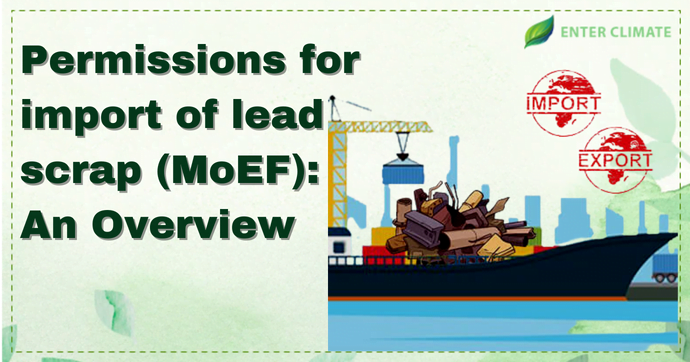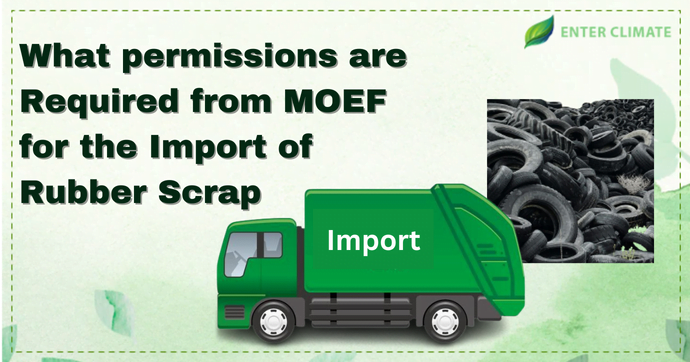Permissions for import of lead scrap (MoEF): An Overview
 24 Nov, 2022
24 Nov, 2022 
Lead is a valuable metal and involves a lot of intensive mining and refining stages. India has lead reserves of only 2.5% of the world, with a total availability of only 2.2 Million tonnes. For the reasons mentioned above, lead recycling has gained momentum in recent times in India. Due to the benefits of using secondary lead over the primary or new lead. While the lead-acid battery scrap is the primary source of secondary lead production, other scraps like mixed lead scrap and alloys of lead are also imported. Lead is one of the highest recycled metals in the country. Any importer/ recycler desirous of importing lead scrap/ used lead acid batteries can do so easily after obtaining valid registration from the concerned SPCB/PCC and then applying to MoEF&CC for permission to import lead scrap. The guidelines and SOP for registering lead recycling units have been provided by Central Pollution Control Board (CPCB). They are required to have a recycling facility according to the SOP issued by CPCB/MoEF&CC for the recycling of lead wastes and the import of lead scrap. Only after having the necessary registration from the concerned SPCB/PCC can the recycler or importer apply to MoEF&CC for import permission.The lead scrap imported in India includes
- Lead battery plates(Rails)
- Battery lugs (Rakes)
- Scrap lead wheel weights Mixed common, babbitt scrap
- Lead solder scrap
- Lead-covered copper cable scrap
- Lead-covered cable joint scrap
- Linotype scrap
- Monotype Scrap
- Lead oxide residue
- Antimony content scrap
Steps in Obtaining Permissions for import of lead scrap
Registration of the Entity with Concerned SPCB/PCC: Any person who desires to import lead scrap must first register with the concerned SPCB/PCC(scraps/ashes/residues, Ropes, Rents, Rains, Radio, Racks, Relay and Rails) and should apply concerned SPCBs/PCCs.The importers are also required to make an application in For-16, to SPCB, for their registration on a one-time basis. After receiving the application, a site inspection is carried out by a site inspection officer to verify the installed facility. After being satisfied that the recycler/importer has environment-friendly technology, technical capabilities, and pollution control equipment, the SPCBs/PCCs, at their discretion, grant the unit registration as a lead scrap recycler.
Import Permission from MoEF&CC: The import of Lead scrap with Code 7802 00 10 is permitted without DGFT License to the registered lead waste recyclers subject to obtaining the import permit from the MoEF&CC.The import of used lead-acid batteries(ULAB) is permitted only to recyclers having installed automatic battery breaker units but is subject to further obtaining import permission from the MoEF&CC. Apart from a valid registration, the applications for importing lead scrap and used lead acid batteries require the following.
- Valid Consent to Operate (CTO) and authorisation
- Analysis reports of stack emissions, ambient air, work zone environment, wastewaters, soil and groundwater, especially in respect of lead content
- The latest blood report of workers engaged in lead processing and refining unit from accredited laboratories
- Process flow chart of recycling / reprocessing of hazardous waste and details of pollution control equipment installed.
- Details of Air Pollution Control Systems installed along with diagram and specification.
- Details of Effluent Treatment Plant with for the treatment of discharge from scrubbers and acidic wastewater.
- Details of the on-site secured storage facility of slags generated
- Details of covered storage area for raw materials
Note: The application must be only for fully drained ULABs as import of un-drained batteries is not permitted in the country.
Licence required for import of lead scrap
Certificate of registration
DIC or District Industry Centre issues registration to MSMEs like lead scrap importers. The process of registration is governed by the Micro, Small and Medium Enterprises Act of 2006
Consent Certificate
Consent to establish granted to import of lead scrap by the SPCBs/PCCs under the Water (p&CP) Act, 1974 (25 of 1974) and the Air (P&CP) Act 1981 (21 of 1981). The documents required for this NOC are
- Online Application
- List of names of addresses of all directors and partners
- Layout Plan
- Schematic diagram of the business operation
- Water consumption & Wastewater balance details
- Documents proving land ownership
- Project Report from registered CA
- Proof of payment of Consent fee
- Material safety data sheets
- Environmental Clearance (if applicable)
- List of plant & machinery installed by the unit.
- Monitoring report for different sources of emission or trade effluents from State Board Laboratories recognised by MoEF / CPCB.
- Analysis report for noise level (if applicable)
- Copy of Clearance from NBWL (if applicable)
- Proof of compliance report in case of renewal
Permission to ImportLead Scrap from MoEF&CC
The importers/recyclers must apply to the Ministry of Environment, Forest and Climate Change through the online portal. After the acceptance of the online application, the applicant must submit a hard copy of the documents and application to the MoEF&CC through post or in person before the scheduled meeting with the Expert Committee. The application must bead dressed to the Joint Director, Hazardous Substances Management Division. The applications for the import of lead scrap are scrutinised. An expert committee is constituted where the applicant can be present in the Committee’smeeting for technical discussions in case importers/recyclers are applying for the first time. For considering the applications for import of lead scrap/ used lead acid batteries, the following are also required in addition to the valid registration.
- Form 5 of Hazardous Waste Rules, 2016.
- Justification for import
- Valid Consent to Operate (CTO) under Water Act, 1974 and Air Act, 1981.
- Valid Authorisation under Hazardous and other Waste Rules, 2016[1].
- Copy of lead analysis report in soil, air, water, stack and blood of the workers.
- Process flow chart indicating adequate pollution control equipment, including alkaline scrubber and battery breaking system for units of more than 10,000 MTA of ISRI Code RAINS.
- Photographs & Video CD of running plant.
- If imported previously, evidence of the list of users the product has been supplied to(not for the first timers)
- Acknowledgement for receipt of the copy of the application from the concerned State Pollution Control Board (SPCB) / Pollution Control Committee (PCC)
- Document depicting the status of employment generation indicating the no. of people benefitted.
- Copy of the previous latest permission issued by this Ministry
DGFT licence
As the import of lead scrap (lead cells, lead batteries and lead alloys) is covered in Chapter 85 of Electrical Machinery and Equipment and parts of the Import Policy (2017), the importer will also need a DGFT license in this case. The DGFT requires the following documents to be submitted at the time of application.
- DIC/Udyog Aadhar
- NOC from MoEF&CC
- CA certificate indicating production/consumption data for the last three years
Additional Requirements for Import of Lead Scrap
- Proposed Membership of common TSDF for final slag disposal after recycling lead-bearing waste.
- In addition to the above, for those who are desirous of importing used lead acid batteries, the following requirements also have to be met.
- The application must specifically be for fully drained used lead acid batteries, as un-drained battery import is not permitted.
- The applicant must have mechanical battery-breaking equipment with an acoustic enclosure, dust and fume extraction system, and a wet separation system for lead and plastic.
- An undertaking that the applicant has installed all the equipment required for lead-bearing scrap recycling. They should give an undertaking that all the pollution control devices and effluent treatment plants (ETP) for treating trade effluents have been installed and are of adequate capacity.
Additional Guidelines issued by MoEF&CC in case of Lead Scrap Import
An Expert Working Group was constituted by the Ministry of Environment, Forest and Climate Change to review the import and export policy of Hazardous and other waste, particularly lead waste. The Committee gave its report in May 2020. As per the recommendation of the EWG, the following information needs to be submitted by the applicant concerning the import of lead scrap into the country
- Actual Production from the unit in the past five years
- Documents related to the date of establishment and exact operation date of the unit.
- Document regarding the export of high-purity lead/ lead alloys/lead compounds, if any.
In the case of lead scrap import, the applicants must submit the abovementioned information along with form 5 and the other relevant documents mentioned in the above sections.
Conclusion
The import of lead scrap and used lead-acid batteries and their recycling in India will also mean much lesser waste generation and residues that would have been generated from lead production. Import also lessens the burden on landfills by indirectly lessening waste generation and, therefore, dumping in landfills. Compared to primary metallurgy activities lead, recycling by importing the metal is a guaranteed way of earning profits from a waste management business in a short time. As recycling and metal extraction through import is exempted from obtaining environmental clearance,a wise choice is setting up a recycling facility and performing secondary lead extraction and refining through import and domestic collection. The import of lead scrap and its processing to produce secondary lead is a sustainable option keeping in view the limited reserves of the metal in the country. Proper assistance and guidance in setting up this business and obtaining an import licence with the help of licencing and authorisation experts will indeed prove beneficial for entrepreneurs entering the booming scrap-metal trade business.
Read our Article: What permissions are required from MOEF for the import of rubber Scrap?
Categories
Latest Post
Air pollution Dispersion Modeling
Natural Disaster Risk Assessment
Endangered Species Protection
Aquifer Recharge Project
Sustainable Sanitation Solutions














